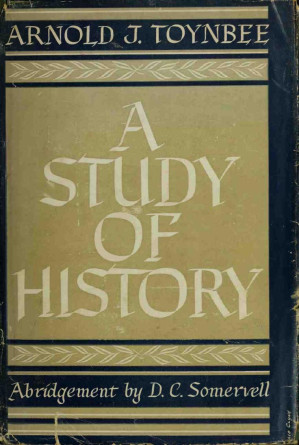A Peter the Great wants so many Russian chinovniks or an East India Company so many clerks, or a Mehmed 'Ali so many Egyptian mill-hands and shipwrights. Incontinently these potters in human clay set to work to produce them, but the process of manufacturing an intelligentsia is more difficult to stop than to start; for the contempt in which the liaison class is held by those who profit by its services is offset by its prestige in the eyes of those eligible for enrolment in it. (p. 415)
uprooted from the countryside and chevied into the towns (p. 416)
It has also rounded up almost all the surviving primitive societies; and while some of these, like the Tasmanians and most of the North American Indian tribes, have died of the shock, others, like the Negroes of Tropical Africa, have managed to survive and set the Niger flowing into the Hudson and the Congo into the Mississippi—just as other activities of the same Western monster have set the Yangtse flowing into the Straits of Malacca. (p. 413)
the characteristic features by which these heterogeneous masses were once distinguished from one another. (p. 413)
process of standardization (p. 413)
The possibility of turning education to account as a means of amusement for the masses—and of profit for the enterprising persons by whom the amusement is purveyed (p. 312)
discharged its accumulated spite in the shattering Bolshevik Revolution of 1917. (p. 415)
the bitterness of the intelligentsia (p. 415)
The man-power of no less than ten disintegrating civilizations has been conscripted into the Western body social (p. 413)
A lower-middle class which has received a secondary and even a university education without being given any corresponding outlet for its trained abilities was the backbone of the twentiethcentury Fascist Party in Italy and National-Socialist Party in Germany. The demoniac driving force which carried Mussolini and Hitler to power was generated out of this intellectual proletariat's exasperation at finding that its painful efforts at selfimprovement were not sufficient (p. 416)
The bread of universal education is no sooner cast upon the waters than a shoal of sharks arises from the depths and devours the children's bread under the educator's very eyes. (p. 312)
the ordeal of being enrolled in the Western internal proletariat (p. 421)
a vein of revolutionary violence which is not yet to be seen in other parts of British India, where the local intelligentsia did not come into existence till fifty or a hundred years later. (p. 416)
In Marxian Communism we have a notorious example in our midst of a modern Western philosophy which has changed, in a lifetime, quite out of recognition into a proletarian religion, taking the path of violence and carving out its New Jerusalem with the sword on the plains of Russia. (p. 419)
And, while the intelligentsia thus has no love lost on it at home, it also has no honour paid to it in the [workplace] whose manners and tricks it has so laboriously and ingeniously mastered. In the earlier days of the historic association between India and England the Hindu intelligentsia which the British Raj had fostered for its own administrative convenience was a common subject of English ridicule. (p. 415)
handful of chinovniks is reinforced by a legion of 'Nihilists', the handful of quill-driving babus by a legion of'failed B.A.s' (p. 415)
uprooting a free peasantry for the economic profit of an oligarchy, by turning ploughland into pasture and common land into enclosures. (p. 417)
This liaison-class suffers from the congenital unhappiness of the hybrid who is an outcaste from both the families that have combined to beget him. An intelligentsia is hated and despised by its own people (p. 414)
candidates increase out of all proportion to the opportunities for employing them, and the original nucleus of the employed intelligentsia becomes swamped by an intellectual proletariat which is idle and destitute as well as outcaste. (p. 415)
[The commercial institutions that set about at once to prey on forced mass schooling] attracted the attention of the rulers of modern would-be totalitarian national states. If press-lords could make millions by providing idle amusement for the half-educated, serious statesmen could draw, not money perhaps, but power from the same source. The modern dictators have deposed the press-lords and substituted for crude and debased private entertainment an equally crude and debased system of state propaganda. (p. 313)
many diverse contingents of disinherited men and women (p. 421)
often quite abruptly and artificially (p. 413)
as the [imperial] virus of Westernism works deeper into the social life of the society which is in process of being permeated and assimilated, the intelligentsia develops its most characteristic types: the schoolmaster [...] the civil servant [...] the lawyer (p. 414)
The edifice of universal elementary education was, roughly speaking, completed [...] in 1870; and the Yellow Press was invented some twenty years later—as soon, that is, as the first generation of children from the national schools had acquired sufficient purchasing-power—by a stroke of irresponsible genius which had divined that the educational philanthropist's labour of love could be made to yield a royal profit to a press-lord. (p. 312)
